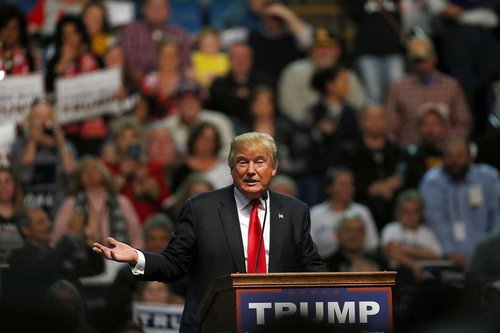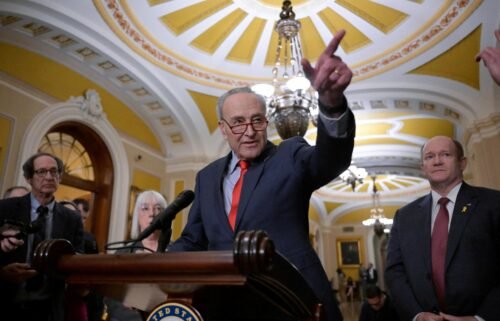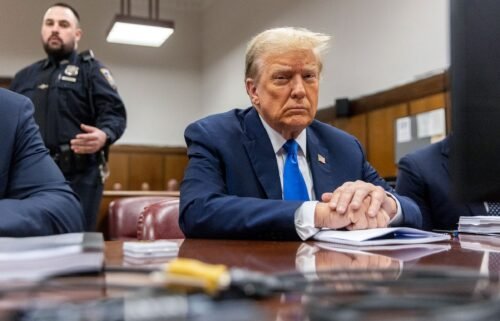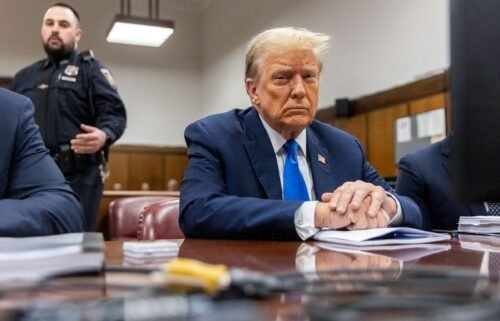Team Trump still divided over decision to release Ukraine transcript

When President Donald Trump declared in September he hoped the world would read his phone call with Ukraine’s President, some of his advisers cringed. The transcript, they believed, would not provide the instant vindication Trump hoped.
One month, more than a dozen witnesses and a formal vote on impeachment proceedings later, the move is still a sore spot. Some aides wonder why the transcript was released at all. And the document’s rollout has been viewed in some corners as a disaster.
But if the resentments are still percolating, the precedent was set. As the impeachment crisis enters a new phase, Trump has established himself as the sole architect of his defense. Instead of working to craft a coherent strategy, officials are now aiming simply to adapt to the President’s lead.
“He is the war room,” White House press secretary Stephanie Grisham said Friday on Fox News, dismissing the suggestion a more robust defense effort be mounted since Trump, she said, was innocent. “We don’t feel the need for a war room and we’ll see what happens.”
A year away from his election reckoning, Trump this week became the fourth US president subjected to formal House impeachment investigation opened by vote. A string of witnesses, some still working at the White House, have come forward to the investigative committees to detail what they describe as concerning behavior toward Ukraine.
At the White House and Trump campaign headquarters, the impeachment developments have become all-consuming. A half-hearted attempt to wall off the matter inside the West Wing has largely been abandoned. Policy items the President once hoped to complete this fall, such as drug price reforms and some type of gun control action, have been put aside.
Some of Trump’s allies, including Republican Sen. Lindsey Graham of South Carolina, have encouraged him to leave the impeachment matter to lawyers and communications specialists. Instead of trying to ignore the matter, however, aides say they are following the lead of the President, who has railed against impeachment at nearly every public appearance since September and tweets about it every day.
In private, Trump has raised the proceedings in meetings with evangelical leaders, lawmakers and others, who came to the White House to discuss other issues but found themselves listening to Trump vent about the situation.
Even Trump’s daughter Ivanka, who has favored a narrow set of policy issues over contentious political talk, made a reference to the fight on Twitter this week.
Asked Friday who was quarterbacking the President’s impeachment efforts, adviser Kellyanne Conway said it was the President himself. She insisted he and the rest of the White House was focused on a governing agenda, despite the Democratic impeachment effort.
“You know the answer: the President,” she said. “We have many people working on that, but we have overstuffed portfolios here to begin with working on the business of America which does not include impeachment.”
Itching to mount a loud self-defense, Trump told aides he wants to appear at more political rallies where he can argue his innocence at length to adoring crowds. The campaign has scheduled a series of events over the next few weeks, with three this week alone. The White House has also planned official events, though those often devolve into rally-like speeches.
The schedule is seen as a chance for the President to trumpet his message while stumping for gubernatorial candidates. Over the next week, he’s due to appear at rallies in Louisiana and Kentucky, and spoke Friday evening in Mississippi.
“The media and the Democrats have been engaged in a corrupt partnership trying to impose their will and to thwart American democracy,” he said in Tupelo, where he was stumping ahead of a gubernatorial election. “This is one I never thought I’d be involved in, the word ‘impeachment.’ “
Impossible to ignore
At the White House, the proceedings have become impossible to ignore. On Tuesday, the first sitting White House official — top Ukraine expert Lt. Col. Alexander Vindman — went before the committee for more than 10 hours, returning to his desk in the Eisenhower Executive Office Building the next morning. Tim Morrison, the director for European affairs on the National Security Council, announced to his colleagues the evening before his Thursday appearance he was stepping down. But his office had yet to be cleared out as he was testifying on Capitol Hill.
Others inside the building are facing their own depositions. Top national security lawyer John Eisenberg and his deputy Michael Ellis have been invited to appear next week, though it appeared unlikely they would do so, at least voluntarily.
If they do refuse to testify — even after receiving subpoenas — they will prove the exception. A White House legal strategy that sought to limit appearances by administration officials largely collapsed, much to Trump’s frustration. The muddled efforts to curtail the investigation through legal means, along with a host of other irritants, have caused internal rifts between White House counsel Pat Cipollone and acting chief of staff Mick Mulvaney.
Meanwhile, efforts to unify and strengthen the messaging around impeachment have proceeded in fits and starts. The White House is still in talks with a former senior Treasury Department official to handle a communications role. In the interim, Trump himself has filled the void.
Though the White House has resisted staffing up in the wake of the inquiry, the President’s reelection campaign has utilized its war room instead. The headquarters in Arlington, Virginia, has a dedicated area with several desks and large televisions that has been buzzing as the campaign has sought to defend Trump and hit Democratic presidential candidate and former Vice President Joe Biden.
The President has leaned into the decision to release the transcript he describes as “perfect” but which — according to congressional testimony — his own aides raised concerns about to administration lawyers.
Despite few Republican senators willing to vouch for the call’s propriety, Trump has insisted the transcript proves his innocence. And he suggested this week he would like to read the conversation in front of a fireplace while the nation watches on television.
Without a master communications plan or a discernible legal strategy, Trump’s team has at least become more adept at following the President’s lead. After Trump suggested in an interview published Thursday that he should sell T-shirts with the words “Read the Transcript,” his campaign was selling them on their website by the next morning.
In private, Trump has aired frustration that more Republicans aren’t proclaiming his innocence as loudly as he is, wondering why his allies in the Senate have remained guarded in their assessment of his behavior. As he and White House officials ramp up their outreach to senators, they have not received firm commitments from many Republicans that they’ll defend Trump’s behavior, even if most acknowledge they do not believe he should be removed from office.
More public phase
As the impeachment efforts enter a new, more public phase, Trump and his allies will be forced to adopt their strategy, which has centered on the procedures rather than the merits of the case.
Trump himself has agitated for that approach for weeks, claiming his actions were above board and that Republicans should defend him against accusations of wrongdoing rather than simply accuse Democrats of running a sham process.
The near party-line vote Thursday that set guidelines for the impeachment proceedings could wind up helping Trump in that regard. Republicans can no longer claim that without a vote the effort is illegitimate, removing a key talking point that allowed some GOP members to avoid answering questions about Trump’s behavior.
Following the 232-196 vote in the House, the White House seized on the two Democrats who voted against it as evidence of “bipartisan” opposition to the measure, claiming two defectors is significant in the current highly partisan moment.
“Two has always been a threshold with a bipartisan vote. In today’s partisan times that’s huge,” one official claimed.
Trump’s campaign said it raised $3 million on the day of the vote, adding to the substantial money advantage the President has over his Democratic rivals as the calendar hits the year-away mark to the presidential election.
That war chest helped fuel the confidence-oozing national television ad that aired during Game 7 of the World Series Wednesday evening. In the spot, Trump’s campaign sought to cast Democrats as preoccupied with impeachment, even as Trump talks of little else. The commercial was adapted quickly to include photos from last weekend’s raid that took out ISIS leader Abu Bakr al-Baghdadi.
“The Democrats would rather focus on impeachment and phony investigations, ignoring the real issues,” read a narrator. “But that’s not stopping Donald Trump. He’s no Mr. Nice Guy, but sometimes it takes a Donald Trump to change Washington.”
Trump’s confidence was augmented by Friday’s monthly jobs numbers, which were better than expected. And he seemed to be seeking a jolt by making a rare trip to his onetime home New York this weekend to take in a UFC fight at Madison Square Garden.
But the return to Manhattan might be bittersweet. It’s his first time back since officially relocating to Florida last month.



